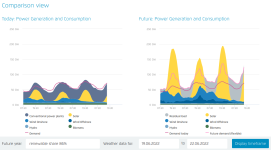Think tank Agora Energiewende provides a pretty simple data dashboard that lets you visualise the result of increased renewable capacity on the grid:
How can the energy transition succeed? What changes should be made to adapt energy systems to the needs of the future? Agora Energiewende provides answers based on scientific research.

www.agora-energiewende.de
I did a comparison between current generation and projected generation with 86% renewables:
View attachment 39163
The dashboard doesn't go higher than 86%. I think that's because it is projecting increases in wind and solar generation, which combined tend to leave huge gaps in generation at night time. You simply cannot get to 100% renewables with those technologies.
The question now is, what's going to fill the gaps left by wind and solar, if not gas?
Perhaps synthetic fuels that can be burned in gas-fired plants? I don't know much about the technology but I would like to know why gas-fired turbines haven't already been converted to use synthetic fuels. What's stopping that from happening?
Efficiency of conversion in both directions is poor, so it’s FAR cheaper to use fossil fuels than synthetics.
The only serious forays into synthetic fuels were by Nazi Germany and later Apartheid South Africa, in both cases because they had plenty of coal, but no access to oil.
In both cases they skipped the very expensive step of trying to concentrate atmospheric carbon dioxide as a feedstock, and just extracted it from cheap coal, which still left them with a product that was hugely expensive compared to mineral oil, and that was essentially a fossil fuel.
The benefit is that you can’t practically use coal for fuel in light vehicles (particularly aircraft), and certainly not as a lubricant. So it’s worth doing if you are a regime that has limited access to oil and needs cars, trucks and aircraft; But it’s not worth doing if you want to generate electricity, and even less so if you want to generate electricity without burning fossil fuel.
If you have enough reliable, cheap, and consistent low-carbon electricity to make synfuels from atmospheric carbon, and you have a means to concentrate atmospheric carbon dioxide for your feedstock at low cost, then synfuels for vehicles are a neat idea; But you need the cheap and reliable electricity as an input, if you are going to keep costs comparable with use of fossil oil, and burning synfuels to get that electricity is like trying to lift yourself up by your shoelaces.
As it happens, power plant cooling towers can be fairly easily and cheaply used to extract carbon dioxide from the atmosphere for making synfuels. But of course, you only get that kind of facility at coal or nuclear plants.
The best option for ground vehicle fuels is probably to just use electricity; That way the amount of synthetic oil needed for lubricants and aviation fuels becomes far less, and producing enough from the sparse carbon supply available in air stops being such a mammoth problem. As long as you have plenty of power plants with cooling towers. You can probably see where this is headed…

